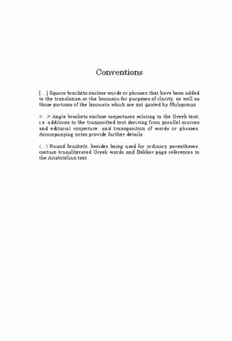Download Philoponus: On Aristotle Posterior Analytics 1.19-34 PDF Free - Full Version
Download Philoponus: On Aristotle Posterior Analytics 1.19-34 by Owen Goldin; Marije Martijn in PDF format completely FREE. No registration required, no payment needed. Get instant access to this valuable resource on PDFdrive.to!
About Philoponus: On Aristotle Posterior Analytics 1.19-34
Aristotle described the scientific explanation of universal or general facts as deducing them through scientific demonstrations, that is, through syllogisms that met requirements of logical validity and explanatoriness which he first formulated. In Chapters 19-23, he adds arguments for the further logical restrictions that scientific demonstrations can neither be indefinitely long nor infinitely extendible through the interposition of new middle terms. Chapters 24-26 argue for the superiority of universal over particular demonstration, of affirmative over negative demonstration, and of direct negative demonstration over demonstration to the impossible. Chapters 27-34 discuss different aspects of sciences and scientific understanding, allowing us to distinguish between sciences, and between scientific understanding and other kinds of cognition, especially opinion.Philoponus' comments on these chapters are interesting especially because of his metaphysical analysis of universal predication and his understanding of the notion of subordinate sciences. We learn from his commentary that Philoponus believed in Platonic Forms as inherent in, and posterior to, the Divine Intellect, but ascribed to Aristotle an interpretation of Plato's Forms as independent substances, prior to the Demiurgic Intellect. A very important notion from Aristotle's Posterior Analytics is that of the 'subordination' of sciences, i.e. the idea that some sciences depend on 'higher' ones for some of their principles. Philoponus goes beyond Aristotle in suggesting a taxonomy of sciences, in which the subordinate science concerns the same scientific genus as the superordinate, but a different species.
Detailed Information
| Author: | Owen Goldin; Marije Martijn |
|---|---|
| Publication Year: | 2012 |
| ISBN: | 9781780930909 |
| Pages: | 218 |
| Language: | English |
| File Size: | 1.377 |
| Format: | |
| Price: | FREE |
Safe & Secure Download - No registration required
Why Choose PDFdrive for Your Free Philoponus: On Aristotle Posterior Analytics 1.19-34 Download?
- 100% Free: No hidden fees or subscriptions required for one book every day.
- No Registration: Immediate access is available without creating accounts for one book every day.
- Safe and Secure: Clean downloads without malware or viruses
- Multiple Formats: PDF, MOBI, Mpub,... optimized for all devices
- Educational Resource: Supporting knowledge sharing and learning
Frequently Asked Questions
Is it really free to download Philoponus: On Aristotle Posterior Analytics 1.19-34 PDF?
Yes, on https://PDFdrive.to you can download Philoponus: On Aristotle Posterior Analytics 1.19-34 by Owen Goldin; Marije Martijn completely free. We don't require any payment, subscription, or registration to access this PDF file. For 3 books every day.
How can I read Philoponus: On Aristotle Posterior Analytics 1.19-34 on my mobile device?
After downloading Philoponus: On Aristotle Posterior Analytics 1.19-34 PDF, you can open it with any PDF reader app on your phone or tablet. We recommend using Adobe Acrobat Reader, Apple Books, or Google Play Books for the best reading experience.
Is this the full version of Philoponus: On Aristotle Posterior Analytics 1.19-34?
Yes, this is the complete PDF version of Philoponus: On Aristotle Posterior Analytics 1.19-34 by Owen Goldin; Marije Martijn. You will be able to read the entire content as in the printed version without missing any pages.
Is it legal to download Philoponus: On Aristotle Posterior Analytics 1.19-34 PDF for free?
https://PDFdrive.to provides links to free educational resources available online. We do not store any files on our servers. Please be aware of copyright laws in your country before downloading.
The materials shared are intended for research, educational, and personal use in accordance with fair use principles.

